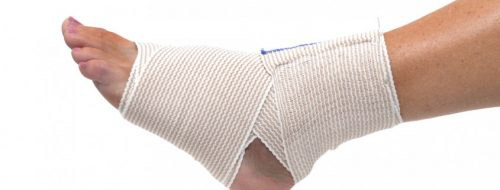A Psychological Focus on Injuries
5th November 2018

This is a pretty apt post for me [Ash] to be writing right now, as I’m currently sitting in A&E dealing with a head injury after a silly bike accident! Injuries can be very frustrating. Beyond the cosmetic, they can clearly impair our performance in the gym and quality of life outside of it. Here I take a look at a psychological focus upon injuries.
It’s always really important to have medical professional’s insight into any injury situation, as they will understand the treatment process required to get you mended as much as possible. Likewise, any additional stressors upon your body (such as training) will need to be re-evaluated to prevent delaying or worsening your condition.
As I await my concussion-check (as although I currently appear sound-of-mind enough to transcribe this post), I’ve clearly already ruled out my training I was planning to do this evening. However, assuming all is clear under the surface, I should be back into training in a few days time and my grazes will mend over the coming week. My ego might take a little longer!
Had I been less lucky, I might now be experiencing broken bones – or worse. Injuries to bones, tendons and ligaments require more time and planning, and. the protocols involved in recovering from damage to the body can be quite invasive. Daily exercises set by physios, difficulties caring for oneself because of casts and tiredness due to pain and healing can all be expected.
My place here is not to offer specific injury recovery exercises. Although at FIT Friends we do work around injuries and include safe adaptations for our clients, I want to use this blog post as an opportunity to focus on the mental side of injury recovery – as each of our health and fitness journey’s often rests upon whether our mindset is supported within a positive environment and belief system.
That thought that you could be “out of action” for a while can be extremely disempowering. Stage one is to try and refine your scope – focussing on the daily wins rather than the “way to go”. It’s always much better to congratulate ourselves on what we have done rather than chasing ourselves to distraction by tallying up all the things we have yet to do or reach.
Secondly, now is a good time to really hone in on the aspects of your life that can be achieved without having to focus upon your injury. For example, if you’ve snapped your Achilles’ tendon, take a look at the process-based goals you can implement for something entirely unrelated. An example would be, “I am going to eat 5 portions of fruit and veg every day,” as you can win at this independently of how fast your Achilles is recovering.
Speaking of nutrition, there are a couple of things to bear in mind. Depending upon the site of your injury/injuries, your body may either be moving less or working harder to compensate for the injury. It’s always important to eat enough for general health and wellbeing (regardless of if you are injured or not!) but it is likely that your body will be working harder right now to repair damaged cells in your body. This increased metabolic activity may translate to a slightly higher energy burn versus your body’s normal resting state.
Essentially, unless doctors have prescribed a particular diet (e.g. burn victims have to eat many additional calories), try to eat a good range of fruit and vegetables and aim to maintain your body weight. Now is not the time to take away energy to try to lose weight (you’re likely to slow your recovery process and may lose muscle mass, especially if your activity has decreased). Likewise, be wary of emotional eating or boredom eating. Keep yourself as mentally engaged as possible, and aim for food quality to support your body’s recovery. A wide range of nutritious foods will help to restore red blood cells, repair skin and bone, and to give you energy.
Depending upon how the injury was brought about, it can also be a good time to start planning injury-prevention exercises and routines. A common culprit for shoulder injuries stems from weak or imbalanced rotator cuff muscles (tiny muscles that help to move the shoulders in all different directions). In tandem with discussions with your physician(s), research different “prehab” exercises (such as resistance band shoulder rotations) you can do to prevent injury occurring again. See this period as a learning experience rather than a failure. If it is due to an accident, see “prehab” as a way of preventing complications.
Injuries are definitely frustrating and it can be extremely worrying not knowing how long it will be before we are feeling ourselves again. Look up some stories of people who have come out of injuries stronger. Look up stories of people who have used their time out of the gym to launch new businesses and create new, awesome ideas. Equally – acknowledge your frustration; connect with others and vent where you need to – but be wary of fixating upon something you cannot change or fast forward.
Empower yourself with the wins and the progress. Cry a little bit if you need to – but wipe your tears away after you’ve had a moment, and set yourself some little tasks you can succeed at for the immediate future. Today’s little task for me was to write this post – which I definitely feel satisfied having completed.
[Update after having written this post: I’m completely fine and have recovered from the incident, but may not have been so lucky! Remember to take your recovery and health seriously to prevent an injury taking extra time to heal.]
